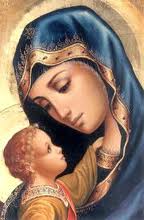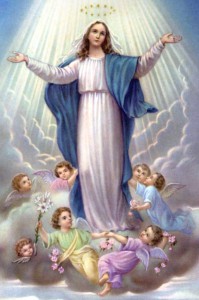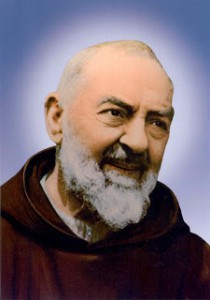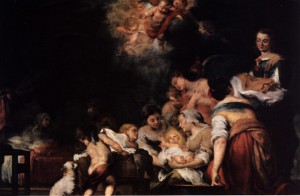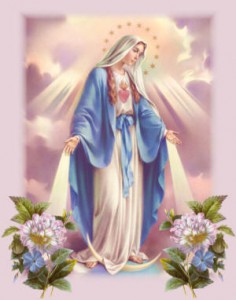APOSTOLIC JOURNEY TO ZIMBABWE, BOTSWANA, LESOTHO,
SWAZILAND AND MOZAMBIQUE
HOLY MASS IN THE PRO-CATHEDRAL OF ROMA (LESOTHO)
HOMILY OF JOHN PAUL II
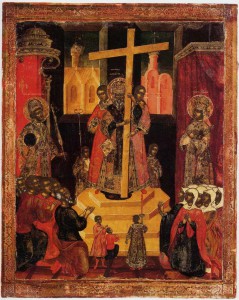 Feast of the Triumph of the Cross
Feast of the Triumph of the Cross
Wednesday, 14 September 1988
Dear Brothers and Sisters,
1. Today it is my great joy to be together with you, the faithful of the Church in Lesotho, on the feast of the Triumph of the Cross, celebrating the Eucharistic Liturgy which in the Cross of Christ has its beginning and source.
I give thanks to God for the privilege of being here in Roma where Father Joseph Gérard served Christ for many years. In the love of Jesus, I offer cordial greetings to my brother bishop and to the priests and religious of this beloved country, as well as to those from other lands. In a special way, I greet the parents and their children, the families of Lesotho who form the primary communities of society and of the Church. I welcome the catechists and teachers who perform such a vital role in the work of evangelization in this mountainous and rugged land, and I offer warm greetings to the various Lay Associations: to the members of the Legion of Mary, the Saint Cecilia Association, the Ladies of Saint Ann and the Men of the Sacred Heart.
I also extend a warm welcome to our brothers and sisters in Christ from other Churches and Ecclesial Communities and to all those of good will who have wished to join us today in prayer.
2. In the Gospel of this feast we are witnesses of an unusual conversation between Jesus and Nicodemus. The conversation takes place at night because Nicodemus, a prominent Jew, went to talk with Christ under the cover of darkness. Christ leads this man, a teacher, to the very heart of the mystery revealed by God. It is the mystery of the Son of God who descended from heaven and, as the Son of Man, accomplished the messianic mission among the people of Israel.
This mission was directed towards “the lifting up” of Christ on the Cross. Jesus says to Nicodemus: “The Son of Man must be lifted up as Moses lifted up the serpent in the desert” (Io. 3, 14). Nicodemus knows the Scriptures well; he knows the inspired message of the Old Testament. He can recall the event that took place during the journey of the chosen people in the desert. At the command of Yahweh, “Moses fashioned a bronze serpent which he put on a standard” (Nu. 21, 9).
This bronze serpent would restore to health and save the lives of the Israelites who had been bitten by the serpents. They were serpents with a poisonous venom; after being bitten by them many Israelites died. But the serpent made of bronze and placed on a high standard would become a means of salvation: whoever looked at it would live.
3. Jesus continues: “The Son of Man must be lifted up… so that everyone who believes may have eternal life in him” (Io. 3, 14-15). The human family had received at the very beginning of earthly history a deadly bite from the “ancient serpent”. He had injected a satanic venom – the venom of original sin – into the souls of the first man and woman. And from that time onward, man’s history on earth has been burdened by sin. A tendency towards sin has generated many evils in the lives of individual persons and the communities to which they belong, in families, in entire peoples and nations.
“The Son of Man must be lifted up”, says Jesus to Nicodemus. And he says this with a view to his crucifixion: The Son of Man must be lifted up on the Cross. Whoever believes in him, whoever sees in this Cross and in the Crucified One the Redeemer of the world, whoever looks with faith on the redemptive death of Jesus on the Cross, finds in him the power of eternal life. By this power, sin is overcome. People receive forgiveness of their sins at the price of the Sacrifice of Christ. They find again the life of God which had been lost by sin.
4. This is the meaning of the Cross of Christ. This is its power. “God sent his Son into the world not to condemn the world, but so that through him the world might be saved” (Io. 3, 17).
The feast that we celebrate today speaks of a marvellous and ceaseless action of God in human history, in the history of every man, woman and child. The Cross of Christ on Golgotha has become for all time the centre of this saving work of God. Christ is the Saviour of the world, because in him and through him the love with which God so loved the world is continuously revealed: “God loved the world so much that he gave his only Son” (Ibid. 3, 16).
– The Father gave him so that this Son, who is one in substance with him, would become man by being conceived of the Virgin Mary.
– The Father gave him so that as the Son of Man he would proclaim the Gospel, the Good News of salvation.
– The Father gave him so that this Son, by responding with his own infinite love to the love of the Father, might offer himself on the Cross.
5. From a human point of view, Christ’s offering of himself on the Cross was a sign of contradiction, an unthinkable disgrace. It was, in fact, the most profound humiliation possible.
In today’s liturgy, the Apostle Paul speaks to us in words that capture the mystery of the Cross of Christ: “His state was divine, yet he did not cling to his equality with God but emptied himself to assume the condition of a slave, and became as men are; and being as all men are, he was humbler yet, even to accepting death, death on a Cross. But God raised him high” (Phil. 2, 6-9).
Through his self-emptying on Golgotha, in the disgrace of the Cross and the crucifixion (at least in the human way of understanding these events) Christ receives the highest exaltation. In God’s eyes, the Cross is the greatest triumph. The way of human judgement is very different from God’s. God’s judgement far surpasses ours. What seems to us to be failure is, in God’s eyes, the victory of sacrificial love.
It is precisely this Cross of human disgrace that bears within itself the source of the exaltation of Christ in God.
“God raised him high and gave him the name which is above all other names so that all beings in the heavens, on earth and in the underworld, should bend the knee at the name of Jesus and that every tongue should acclaim Jesus Christ as Lord, to the glory of God the Father” (Ibid. 2, 9-11).
To the eyes of the Apostles this was revealed through the Resurrection of Christ. At that moment they understood that Christ is the Lord, that he has been given all power in heaven and on earth. At that moment their eyes and their hearts were opened, so that the lips of Thomas could profess: “My Lord and My God”! (Io. 20, 28). And once they had come to believe, through the power of the Spirit of Truth, they were ready to go forth into the whole world to teach all nations, baptizing them in the name of the Father and of the Son and of the Holy Spirit (Cfr. Matth. 28, 19).
6. Yes, it is through the Cross that Christ is exalted. Today’s feast of the Church speaks to us of this mystery. At the same time, it speaks of Christ who by means of the Cross lifts up humanity, lifts up all humanity and indeed all creation. “For God sent his Son into the world not to condemn the world, but so that through him the world might be saved” (Io. 3, 17).
Being “saved” means that every man and woman can be healed of the sin that poisoned the human family and all history. Jesus says to his Apostles after his Resurrection: “Those whose sins you forgive, they are forgiven”. And as he says it he shows them the wounds of his crucifixion, to let them know that it is precisely in the Cross that the power to forgive sins is hidden, the power to heal consciences and human hearts.
Generation after generation passes. And in the midst of this passing, the Cross of Christ remains. Through the Cross, God continuously proclaims to the world the infinite love which no created evil is able to overcome. Yes, the Cross remains, so that in it the world, indeed every human person, may find the way of salvation. For it is by this Cross that the world is saved!
Pope John Paul II’s complete homily may be found here
BOOK OF HEAVEN
From the Writings of the Servant of God Luisa Piccarreta
VOLUME 1
One morning – it was the day of the Exaltation of the Cross – my sweet Jesus transported me to the holy sites; and first, He told me many things about the virtue of the cross. I don’t remember all, but just a few things: “My beloved, do you want to be beautiful? The cross will give you the most beautiful features that can possibly be found, both in Heaven and on earth; so much so, as to enamor God, who contains all beauties within Himself.”
Jesus continued: “Do you want to be filled with immense riches – not for a short time, but for all eternity? Well then, the cross will administer to you all kinds of riches – from the tiniest cents, which are the little crosses, up to the greatest amounts, which are the heavier crosses. Yet, men are so greedy to earn a temporal penny, which they soon will have to leave, but do not give a thought to earning one eternal cent. And when I, having compassion for them, in seeing their carelessness for all that regards eternity, kindly offer them the opportunity – instead of cherishing it, they get angry and offend Me. What human madness – it seems that they understand it upside down. My beloved, in the cross are all the triumphs, all the victories, and the greatest gains. You must have no aim other than the cross, and it will be enough for you, in everything. Today I want to make you content; that cross which until now has not been enough to lay you on and crucify you completely, is the cross that you have carried up to now. But since I have to crucify you completely, you need new crosses which I will let descend upon you. So, the cross you have had until now, I will bring to Heaven, to show it to the whole celestial court as pledge of your love, and I will make another one descend from Heaven – a larger one, to be able to satisfy the ardent desires I have upon you.”
Volume 15 – 2/16/23 – “My daughter, how many things will my Will make known of what my Humanity operated in this Divine Will! In order to operate the perfect and complete Redemption, my Humanity had to do It in the sphere of Eternity. Here is the necessity of an Eternal Will. If my human will did not have an Eternal Will with itself, all my acts would be limited and finite acts; but with It, they are endless and infinite. Therefore, my pains, my Cross, had to be endless and infinite, and the Divine Will made my Humanity find all these pains and crosses; so much so, that It laid Me over the whole human family, from the first to the last man, and I absorbed all kinds of pains within Myself, and each creature formed my Cross. So, my Cross was as long as all centuries are and will be, and as wide as the human generations. It was not just the little cross of Calvary on which the Jews crucified Me; that one was nothing but a simile of the long Cross on which the Supreme Will kept Me crucified. So, each creature formed the length and the width of the Cross, and as they formed it, they remained grafted in that same Cross; and the Divine Will, laying Me over It and crucifying Me, made the Cross not only my own, but of all those who formed that Cross. This is why I needed the sphere of Eternity to keep this Cross – the terrestrial space would not be enough to contain It.
Oh! how much will creatures love Me, when they come to know what my Humanity did in the Divine Will, and what It made Me suffer for love of them. My Cross was not of wood – no; It was made of souls. It was them that I felt palpitating in the Cross on which the Divine Will laid Me – and It let none of them escape Me, It gave a place to each one, and in order to give a place to all, It stretched Me in such a harrowing way, and with pains so atrocious, that I could call the pains of my Passion little, and reliefs. Therefore, hasten, so that my Will may make known all that this Eternal Volition operated in my Humanity. This knowledge will win so much love, that creatures will bend to let It reign in their midst.”

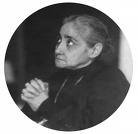
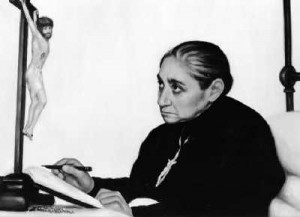
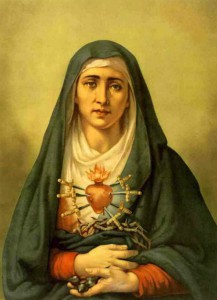
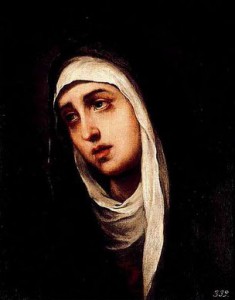
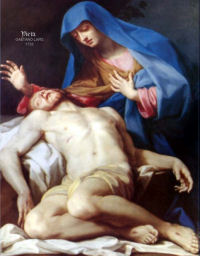 This feast dates back to the 12th century. It was especially promoted by the Cistercians and the Servites, so much so that in the 14th and 15th centuries it was widely celebrated throughout the Catholic Church. In 1482 the feast was added to the Missal under the title of “Our Lady of Compassion.” Pope Benedict XIII added it to the Roman Calendar in 1727 on the Friday before Palm Sunday. In 1913, Pope Pius X fixed the date on September 15. The title “Our Lady of Sorrows” focuses on Mary’s intense suffering during the passion and death of Christ. “The Seven Dolors,” the title by which it was celebrated in the 17th century, referred to the seven swords that pierced the Heart of Mary. The feast is like an octave for the birthday of Our Lady on September 8th.
This feast dates back to the 12th century. It was especially promoted by the Cistercians and the Servites, so much so that in the 14th and 15th centuries it was widely celebrated throughout the Catholic Church. In 1482 the feast was added to the Missal under the title of “Our Lady of Compassion.” Pope Benedict XIII added it to the Roman Calendar in 1727 on the Friday before Palm Sunday. In 1913, Pope Pius X fixed the date on September 15. The title “Our Lady of Sorrows” focuses on Mary’s intense suffering during the passion and death of Christ. “The Seven Dolors,” the title by which it was celebrated in the 17th century, referred to the seven swords that pierced the Heart of Mary. The feast is like an octave for the birthday of Our Lady on September 8th.
